










By Post Staff
The City of Oakland is requiring all employees to return to the office, thereby ending the telecommuting policy established during the pandemic that has left some City Hall departments understaffed.
City Administrator Jestin Johnson recently told city unions that he is ending Oakland’s telecommuting program. The new policy will require employees to come to work at least four days a
week.
These new regulations go into effect on Feb. 18 for non-union department heads, assistant and deputy directors, managers, and supervisors. All other employees must be back at work by April 7.
The administration may still grant the right to work remotely on a case-by-case basis.
In his memo to city unions, Johnson said former President Joe
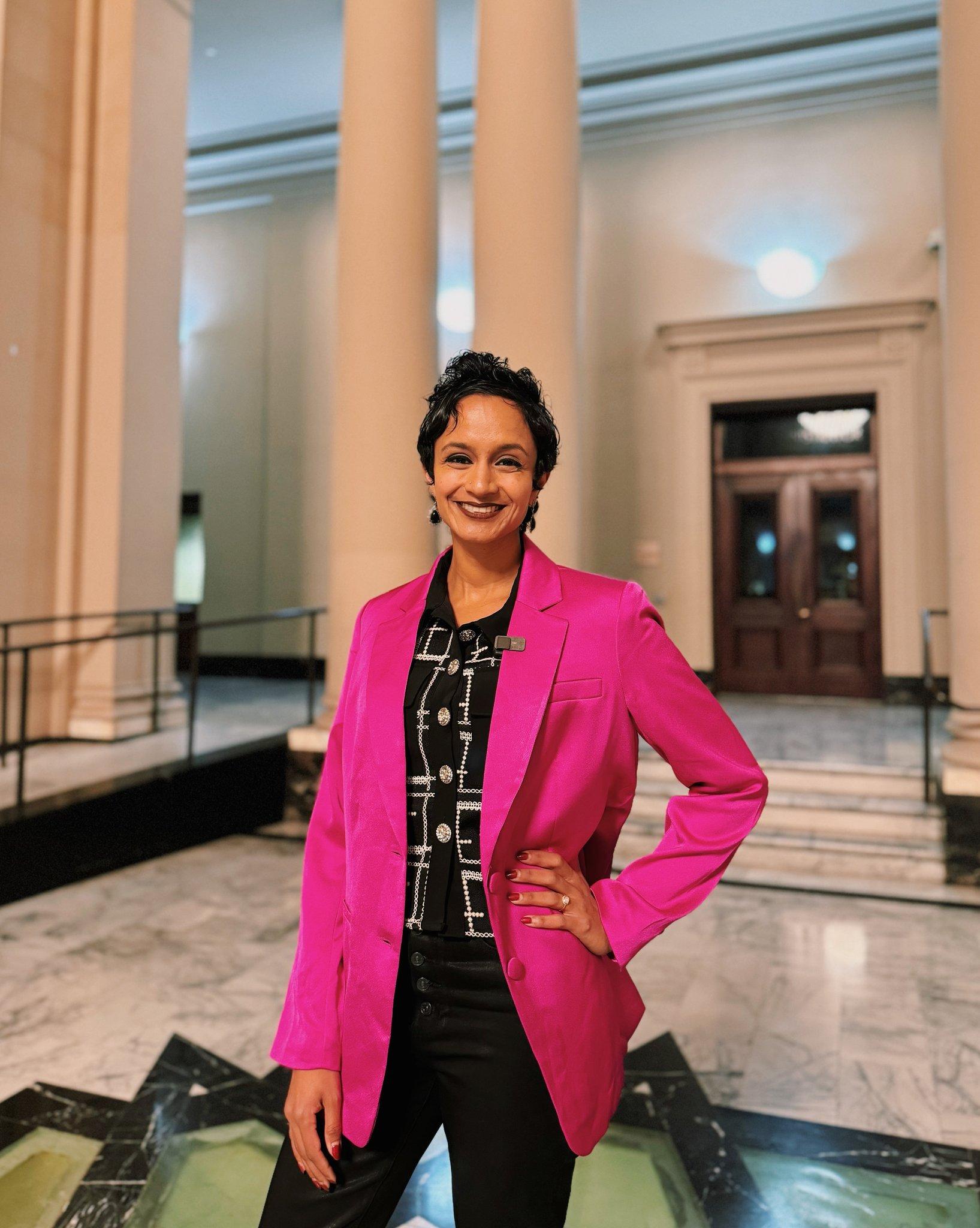
By Janani Ramachandran
There is no greater concern to the people of Oakland today than public safety. Fire stations are the bread and butter of essential city services – and every day that we have stations shuttered, we imperil the lives of our community members. In response to widespread outcry over the current and
planned closure of stations, myself, along with Councilmembers Kaplan and Unger, have painstakingly worked to identify millions of dollars of new funding to save our stations. The legislation we introduced on Thursday Feb. 13th will amend our budget to prevent the closure of four fire stations that are currently on the chopping
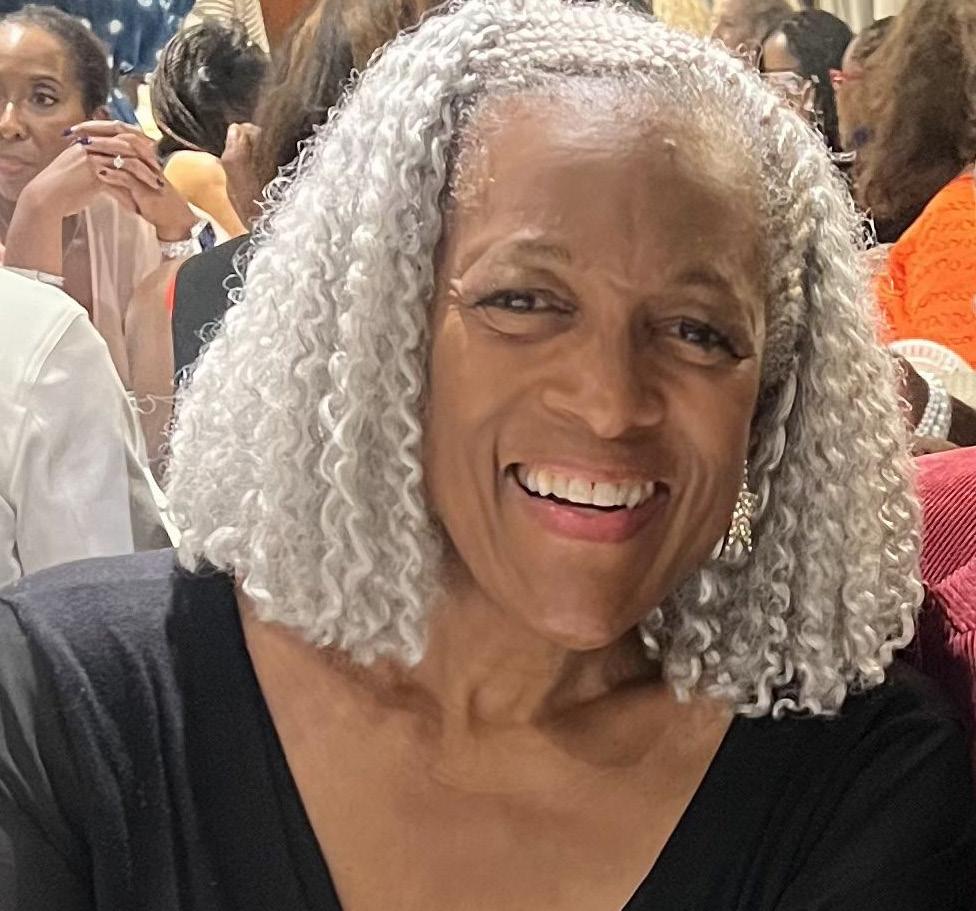
By Post Staff
There were two things Oaklandborn, East Palo Alto-raised Ricki Stevenson always dreamed of:
1. Going to New York as a newscaster to tell the true story of Blacks in America.
2. Living and working in Paris one day.
Her dreams of life in Paris began when she was three years old and her mother, a former professional dancer, took her to see Josephine Baker perform. She was 11 when her parents took her to the Stanford University campus to meet James Baldwin, who was speaking about his book, “The Fire Next Time.” Ricki says that’s when she knew she’d one day live in Paris, “the city of light!”
But before that would ever happen, she had a tumultuous career as a newscaster across the country that was inspired by her family’s history.
Stevenson recalls marching with Cesar Chavez as he fought for labor rights for farm workers in California.
“Are we Mexican too?” she asked her parents. “No, but we will fight for everyone’s human rights,” they responded to her. Ironically, Ricki’s paternal family roots went back to Greenwood, Oklahoma, infamous for the 1921 bombing of Black Wall Street. A time when Black people had oil wells, banks, and a thriving business community.
This background would propel her into a 25-year journalism career that gave her the opportunity to interview greats like President Jimmy Carter, PLO leader Yassir Arafat, James Baldwin, Rev. Jesse Jackson, UN Ambassador Andrew Young, Miriam Makeba, and the leaders of South African liberation movements.
A job offer from KCBS radio
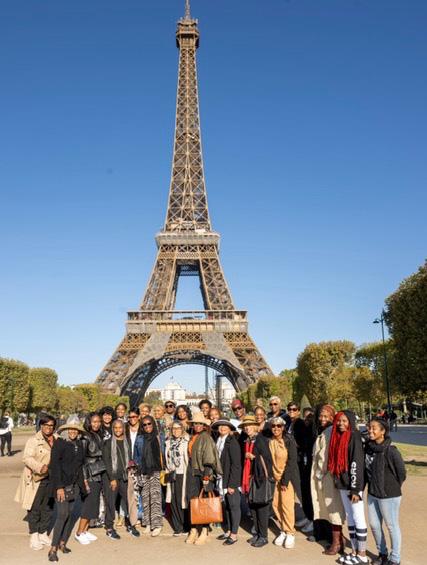
brought her back to the Bay Area in the 1980s. Then came the switch to TV when she was hired as a Silicon Valley business reporter with KSTS TV, working at the first Black-owned television station in northern CA (created and owned by John Douglas). Along the way, Stevenson worked as an entertainment reporter with BET; coproduced, with her disc jockey brother Isaac, a Bay Area show called “Magic Number Video;” lived in Saudi Arabia; worked as an international travel reporter with News Travel Network; and worked at KRON TV a news anchor and talk show host.
In 1997, Stevenson realized her dream of living in Paris with her young daughter, Dedie. She started exploring the history of Africans in the city and would go on to teach others the same. Her business, which she named Black Paris Tours (BPT), received a significant boost when a family friend, Admiral Robert Toney put a chunk of money in her hand. He said, “Ricki, my wife and I have been coming to Paris for 20 years, but in just two days with you and Dedie, we’ve learned and seen more than we ever did before.”
Years after BPT took off, Ricki

3
The Post mentioned three weeks
and programs
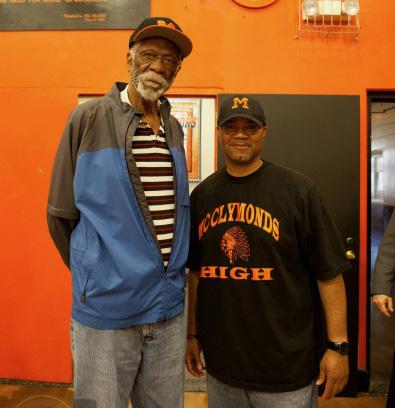
By Ken Epstein
West Oakland’s McClymonds
High School, “the School of Champions,” this week named the school’s gymnasium in honor of one of its most famous graduates, basketball legend Bill Russell (class of ’52).
William “Bill” Felton Russell was born on Feb. 12, 1934, and died on July 31, 2022. He achieved fame as a U.S. professional basketball player who played center for the Boston Celtics of the National Basketball Association (NBA) from 1956 to 1969. He was the centerpiece of the Celtics dynasty that won 11 NBA championships during his 13-year career.
Russell is widely known as one of the greatest basketball players of all time. In 2011, he
received the Presidential Medal of Freedom, the country's highest civil honor, from President Barack Obama for Russell’s contributions to basketball and the Civil Rights Movement. The McClymonds’ naming ceremony was held on Wednesday, the same day as Russell’s birthday. Oakland leader Bill Patterson, a longtime friend of Russell’s, was scheduled to cut the ribbon at the reopening of the gym, which had been closed for several months for renovation. Russell’s daughter Karen was scheduled to attend the ribbon cutting.
Russell’s name and signature are now printed on the gymnasium floor.
Patterson was working at DeFremery Park when he met

By Bo Tefu California Black Media
A lawsuit filed in federal court accuses the University of California (UC) of racial discrimination in undergraduate admissions, alleging that Black and Latino students are favored over Asian American and White applicants.
The lawsuit, filed by the group Students Against Racial Discrimination, claims UC’s admissions policies violate Proposition 209, a state law passed in 1996 that prohibits the consideration of race in public education.
The lawsuit also alleges UC is violating the Equal Protection Clause of the 14th Amendment and Title VI of the Civil Rights Act of 1964, which bars racial discrimination by federally funded institutions.
In response, UC stated that race is not a factor in admissions, as per state law, and that student demographic data is collected only for statistical purposes.
Stett Holbrook, a spokesperson for the UC system, said the entity had not been served with the lawsuit.
“If served, we will vigorously
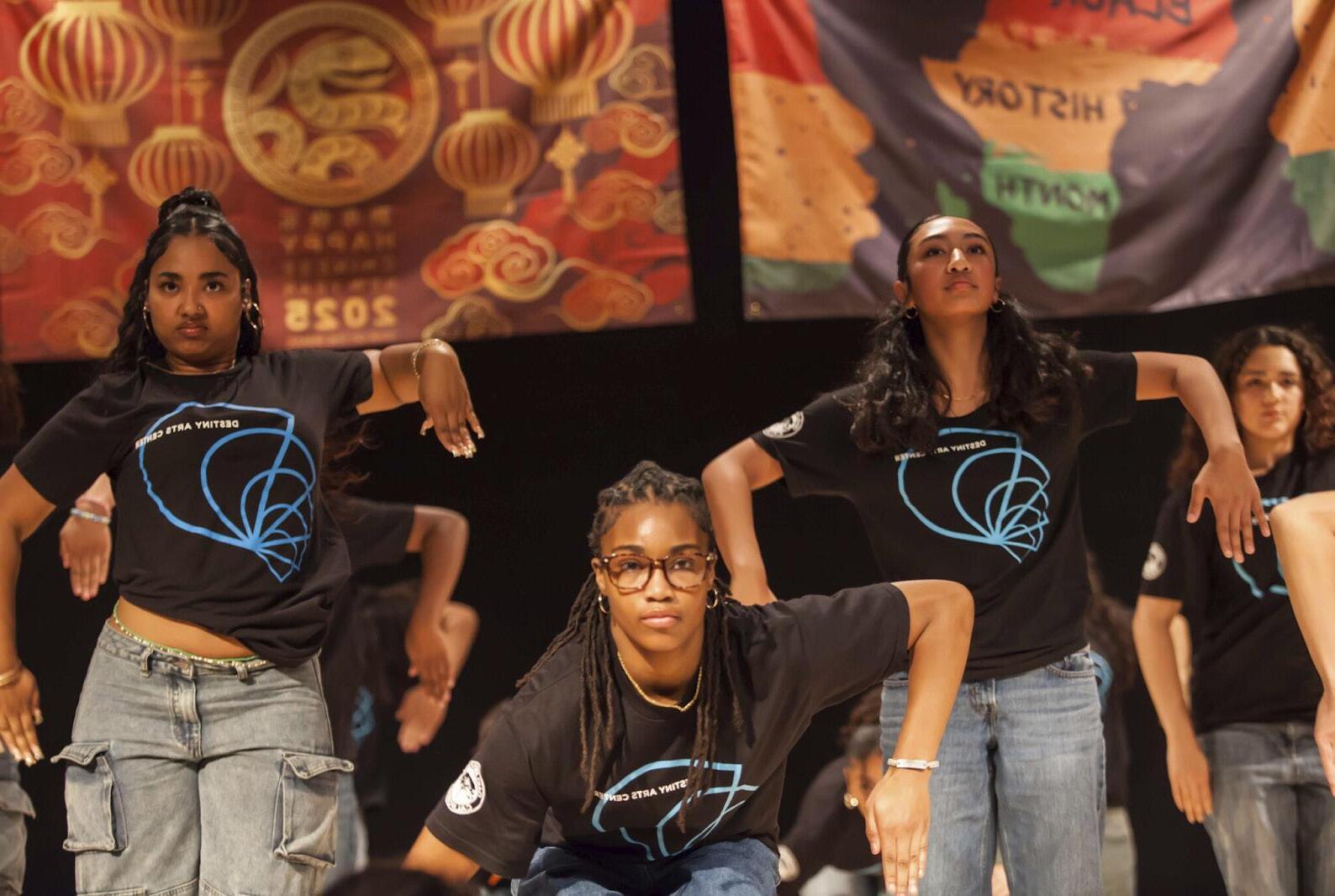
defend our admission practices,” said Holbrook.
“We believe this to be a meritless suit that seeks to distract us from our mission to provide California students with a world class education,” he said.
The complaint criticizes UC’s use of a “holistic” admissions process, arguing it replaces objective academic criteria with subjective considerations that disadvantage certain racial groups. It cites admission rate disparities at UC Berkeley, noting a decrease in Black student admissions from 13% in 2010 to 10% in 2023, compared to an overall drop from 21% to 12%.
The lawsuit follows the U.S. Supreme Court’s 2023 ruling banning affirmative action in college admissions, which has prompted challenges to race-conscious policies nationwide. The plaintiffs seek a court order preventing UC from collecting racial data in applications and request a federal monitor to oversee admissions decisions.
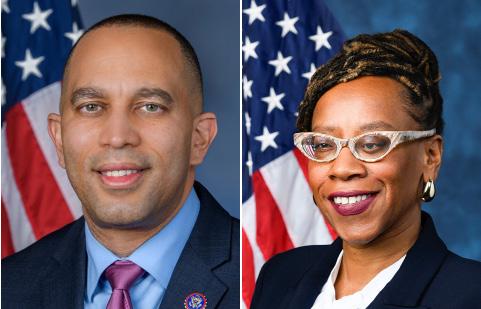
U.S. House Minority Leader
Hakeem Jeffries and Rep. Lateefah Simon to Speak at Elihu Harris Lecture Series
By Scott Horton
United States House of Representatives Minority Leader Hakeem Jeffries (D-NY-8) will be a speaker at the Barbara Lee and Elihu Harris Lecture Series on Friday, Feb. 21.
The event will be held at the Henry J. Kaiser Center for the Arts, 10 Tenth Street in Oakland, at 7 p.m.
The popular lecture series is co-produced by the Oaklandbased Martin Luther King Jr. Freedom Center and Peralta Community College District. Jeffries’ appearance marks the 32nd lecture of the Barbara Lee and Elihu Harris Lecture Series, which has provided thousands of individuals with accessible, free, high-quality information.
The overarching goal of the lecture series is to provide speakers from diverse backgrounds a platform to offer their answers to Dr. King’s urgent question, which is also the title of Jeffries’ latest book: “Where do we go from here: Chaos or Community?”
In addition to Jeffries, Congresswoman Lateefah Simon
(D-CA-12) will also speak.
“Certainly, now is a time for humanity, in general, and Americans in particular to honestly and genuinely answer Dr. King’s question,” said Dr. Roy D. Wilson, Executive Director of the Martin Luther King Jr. Freedom Center and Executive Producer of the lecture series.
“Dr. King teaches that time is neutral but not static. Like the water in a river, it arrives and then quickly moves on,” continued Wilson. “We must urgently create conditions for listening to many different answers to this vital question, and generate the development of unity of action among all those who struggle for a stronger democracy.”
In his book, Jeffries shares his experience of being unanimously elected by his colleagues as the first AfricanAmerican in history to ever hold the position of House Minority Leader.
In January 2023 in Washington, Jeffries made his first official speech as House Minority Leader. He affirmed
By Anka Lee Post Intern
Featuring lion dance, hip-hop dance and more, the third annual Lunar New Year Black History Month drew a multiracial and multi-ethnic crowd to the Oakland Asian Cultural Center on Feb. 1.
Perhaps unique in the U.S., this deliberately bicultural celebration honored diversity in both communities.
The celebration grew out of a time of significant tension between the Asian and Black communities during the pandemic when antiAsian hate was prominent and appeared in a lot of media coverage. In those news stories, members of the Black community were frequently and untruthfully portrayed as the primary aggressors.
In response to this rift between communities, the Oakland Asian Cultural Center (OACC) started the Open E.A.R.S. for Change ini-
Democratic values one letter of the alphabet at a time. His words and how he framed them as the alphabet caught the attention of Americans, and the speech was later turned into a book, The ABCs of Democracy, bringing Congressman Jeffries rousing speech to vivid, colorful life, including illustrations by Shaniya Carrington. The speech and book are inspiring and urgent as a timeless reminder of what it means to be a country with equal opportunities for all. Jeffries paints a road map for a brighter American future and warns of the perils of taking a different path.
Before his colleagues unanimously elected him Minority Leader in 2022, Jeffries previously served as Chair of the House Democratic Caucus and as an Impeachment Manager during the first Senate trial of the 45th President of the United States.
Jeffries was born in Brooklyn Hospital, raised in Crown Heights, grew up in the Cornerstone Baptist Church and he is a product of New York City’s public school system, graduating from Midwood High School. Jefferies went on to Binghamton University (BA), Georgetown University (master’s in public policy) and New York University (JD).
He served in the New York State Assembly from 2007 to 2012.
Admission is free for the Feb. 21 Barbara Lee and Elihu Harris Lecture Series featuring Congressman Jeffries. Please reserve seats by calling the Martin Luther King Jr. Freedom Center at (510) 4343988.
Signed copies of his book will be available for purchase at the event.
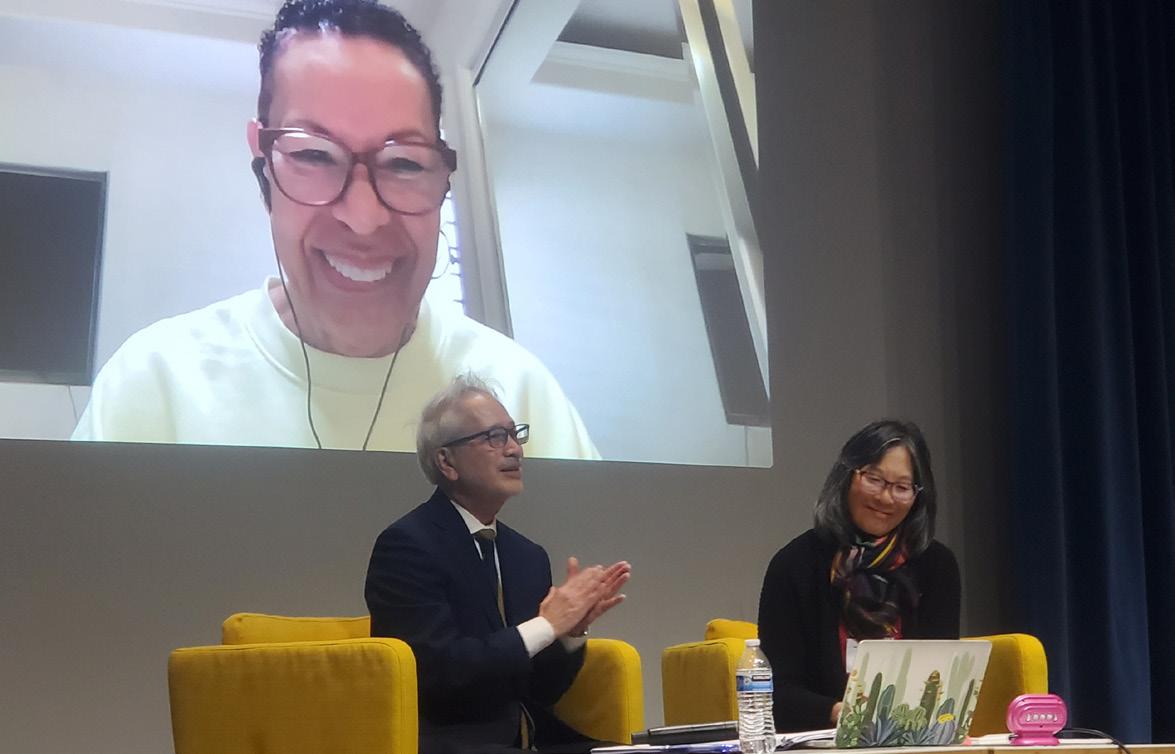
tiative (Engage, Activate and Rise up Series), which was created with the intention to build stronger relationships between the Asian and Black communities in Oakland.
According to Saly Lee, the executive director of OACC, the bicultural celebration began with holding a series of community conversations to bridge cultural gaps and get input on what could be done. It took 18 months, but the first gathering in 2023 drew 1,200 people and the second was 1,800.
Voices of a Dream, along with Dimensions Dance Theatre and Destiny Arts Center were among the African American performers.
The participating Asian groups were diverse—with Filipino rapper Amihan, the Great Wall Youth Orchestra, Korean drumming, and Filipino martial arts.
The children’s story-telling activity was bicultural as well, co-
By Antonio Ray Harvey California Black Media
Two former members of the California Task Force to Study and Develop Reparation Proposals for African Americans shared some of their experiences developing a 1,075-page report that detailed injustices suffered by African Americans during and after chattel slavery.
Los Angeles-based clinical psychologist Dr. Cheryl Grills and Bay Area-based attorney Don Tamaki, who were part of the ninemember reparations panel, spoke at the “Justice Through Action: Black Reparations-Reparative Justice” event hosted by local chapters of the Japanese American Citizens League (JACL) in Sacramento on Feb. 8.
The event was held at the California Museum.
“The first impact that the overall report had on me is that it gave
me a panoramic view and it was a panoramic view of the elephant in the room,” Grills, who attended the event virtually, told the audience.
Grills said the report the task force compiled presented a undiluted version of the Black experience in America/
“You could see the totality of the elephant,” she said. “The report gives you the fullness and density of the elephant, which was, at the same time, validating, overwhelming, and painful.”
The JACL is the nation’s oldest and largest Asian American-Pacific Islander Civil Rights Organization.
The JACL presentation was hosted to observe the 83rd anniversary of Executive Order 9066, which led to the incarceration of 120,000 Japanese Americans during World War II.
Continued on page 7

Special to the Post
Washington, DC: The National Newspaper Publishers Association (NNPA), representing the Black Press of America, has announced the planning and implementation of a national public education and selective buying campaign across the nation in direct response to those corporate entities that have dismantled their respective Diversity, Equity and Inclusion (DEI) commitments, programs and staffing.
NNPA Chairman Emeritus Danny Bakewell Sr. explained, “Now is the time for the Black Press of America once again to emphatically speak and publish truth to power.”
“We are the trusted voice of Black America, and we will not be silent or nonresponsive to the rapid rise of renewed Jim Crow racist policies in corporate America,” stated NNPA Chairman Bobby R. Henry Sr. “The Black Press of Ameri-
ca continues to remain on the frontline keeping our families and communities informed and engaged on all the issues that impact our quality of life.”
At a recent convening of NNPA member publishers and editors, a united resolve was reached that each member publication of the NNPA will begin a national public education campaign coupled with the release of research data on those America companies that are engaging in efforts to sanction racial injustice, inequitable polices, divisive leadership, and economic apartheid in America.
“We note forthrightly that Black Americans spend $2 trillion dollars annually as consumers of products and services throughout the United States,” NNPA President and CEO Dr. Benjamin F. Chavis Jr. emphasized. “We now must evaluate and realign to question why we continue to spend
our money with companies that do not respect us,” Chavis continued. “This now must come to an end. These contradictions will not go unchallenged by 50 million Black Americans who have struggled for centuries to ensure equality, fairness and inclusion in our nation’s democracy.”
A selective buying campaign involves exercising the right to select what we spend our money on and who we spend our money with. We are starting with targeting TARGET.
The following are some of the major American companies that have publicly retreated from Diversity, Equity and Inclusion:
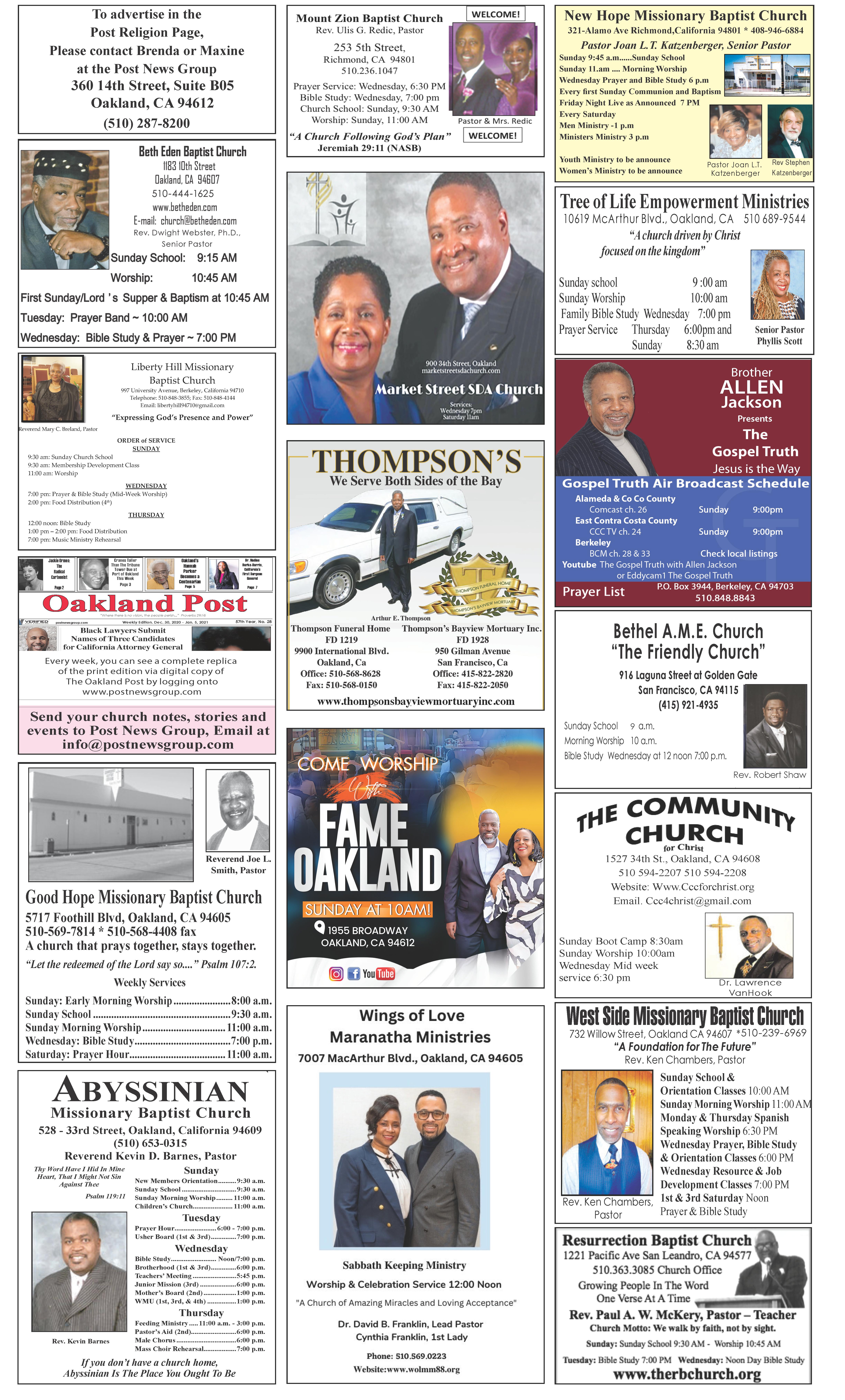
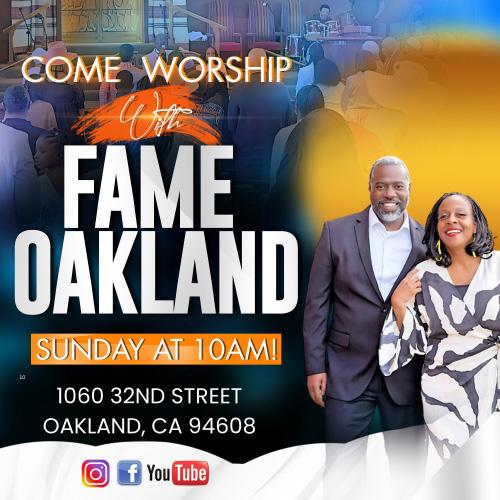
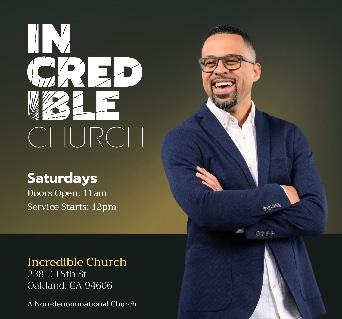
Adult Day Program
Dedicated staff needed to work with individuals with developmental disabilities in communitybased settings, or environments. Qualifications: High school or equivalent. Driver’s license. Dependable and efficient. Background check. Physical exam and TB test. Training available. Decent wages. Please call (510) 690-9570.
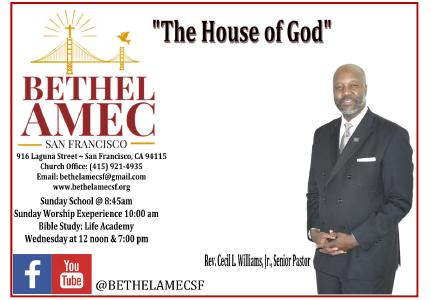
policing.
OPOA has manufactured this crisis by not following the current policy and signaling to criminals that they will not do their job. OPD does not have a “no chase” policy.

Special to The Post
When grants were announced
By Emil Guillermo
a five-year period to spend as they see fit.
Two Filipino American stories made headlines recently.
First, Nikko Remigio, the Filipino and African American kick returner for the Kansas City Chiefs, did not win Super Bowl LIX.
Oct. 1, it was noted that eight of the 22 MacArthur fellows were African American. Among the recipients of the so-called ‘genius grants’ are scholars, visual and media artists a poet/writer, historian, and dancer/choreographer who each receive $800,000 over
The other, Alameda’s Rob Bonta, said no to running for governor. I don’t blame him. It’s not like a mass of people wanted him to run.
But I did.
Whenever there is a Filipino American in a place you don’t expect, I’m rooting for that person.
As California’s Attorney General, Bonta is probably the most active defender among Blue States pushing back against Trump’s Extreme-Right agenda.
I’d like Bonta to run for California’s top job, but he’s better off waiting in line. The Democrats need a spot for Kamala Harris, and Bonta not running obliges the hierarchy.
History can wait. Bonta’s just 52.
Their names are Ruha Benjamin, Jericho Brown, Tony Cokes, Jennifer L. Morgan, Ebony G. Patterson, Shamel Pitts, Jason Reynolds, and Dorothy Roberts. This is the eighth and last in the series highlighting the Black awardees. The report below on Dorothy Rob-
Harris has held off speculation of her next move, saying she just moved back to the state. But it seems governor is the path for her.
For now, Bonta needs to continue taking the fight to Trump in the courts.
Football and Identity Politics
My dad, whose birthday would have been Super Bowl weekend, came to the U.S. in 1928 as a colonized Filipino, an “American National,” where he couldn’t be a cit-
land Police Officers Association (OPOA), Newsom called the Oakland Police Commission irresponsible in their duty to the safety of Oakland residents because they declined to change the pursuit policy when tasked to do so by the Oakland City Council: “In July, I wrote a letter to the Police Commission. I wrote a letter to the City Council. I wrote a let-
lice commission on Sept. 19, 2024, 100 residents of Oakland implored the commission to revise restrictions and restore police chase capabilities. They highlighted to the commission that “Oakland’s businesses are being targeted almost on a daily basis and we need to help our small business owners….it is a plea to help our city thrive.” The original policy was written and amended by OPD with no input or approval from the Oakland
erts is excerpted from the MacArthur Fellows web site.
izen, vote, own property or even marry the person he wanted.
Not if they were white.
I remember going to the team banquet to retrieve my trophy alone.
Still, he believed in America. He never gave up.
Sort of like Nikko Remigio.
My dad would have loved Nikko.
A graduate of Yale University with a law degree from Harvard, Dorothy Roberts is a legal scholar and public policy researcher exposing racial inequities embedded within health and social service systems.
If you haven’t noticed, all Americans are engaged in an even bigger game that means so much more than the Super Bowl. Our democracy is falling apart.
You want to get passionate about Eagles and Chiefs?
Sine 2012, she has been a professor of Law and Sociology, and on the faculty in the department of Africana Studies at the University of Pennsylvania.
Let’s be passionate about our Founding Fathers, too.
Nikko didn’t change the game. He touched it three times and provided more yards than all of KC’s running backs.
That’s all I needed to see.
Roberts’s work encompasses reproductive health, bioethics, and child welfare. She sheds light on systemic inequities, amplifies the voices of those directly affected, and boldly calls for wholesale transformation of existing systems.
He’s our Filipino guy.
Roberts’s early work focused on Black women’s reproductive rights and their fight for reproductive justice. In “Killing the Black
Detractors may call it “identity politics.”
People don’t seem to understand the fight for visibility. To be recognized. To be seen. It’s all wrapped up in the big idea of Civil Rights.
I was nowhere near as good as Nikko when I played. But when you are blessed to play football, you play your hardest.
For me, that was when I was 12 and 13 playing Pop Warner football in San Francisco. I was MVP for my team as a running back.
But I was ashamed of my dad. He wasn’t like the other dads. And

I didn’t realize it probably meant more to him than I thought.
I wish I had shared my MVP moment with him like Nikko shared his joy with his dad, Mark, born in Seattle to two Filipino immigrants, and his mom, whose mixture of Black and white made Nikko the picture of diversity.
Body: Race, Reproduction, and the Meaning of Liberty 1997)”, she analyzes historical and contemporary policies and practices that denied agency to Black women and sought to control their childbearing—from forced procreation during slavery, to coercive sterilization and welfare reform—and advocates for an expanded understanding of reproductive freedom.
Filipino American and Black and White at the Super Bowl.
This work prompted Roberts to examine the treatment of children of color in the U.S. child welfare system.
But don’t forget, there is one game bigger.
The Super Bowl for Democracy. We’re battling for it every day Trump pushes a cockamamie idea that shakes the foundation of our Democracy.
About the Author
Emil Guillermo is an awardwinning journalist and commentator. Watch his micro-talk show
“Emil Amok’s Takeout/What Does an Asian American Think?” on www.YouTube.com/emilamok1 Or join him on http://www.patreon.com/emilamok
After nearly two decades of research and advocacy work alongside parents, social workers, family defense lawyers, and organizations, Roberts has concluded that the current child welfare system is in fact a system of family policing with alarmingly unequal practices and outcomes. Her 2001 book, “Shattered Bonds: The Color of Child Welfare,” details the outsized role that race and class play in determining who is subject to
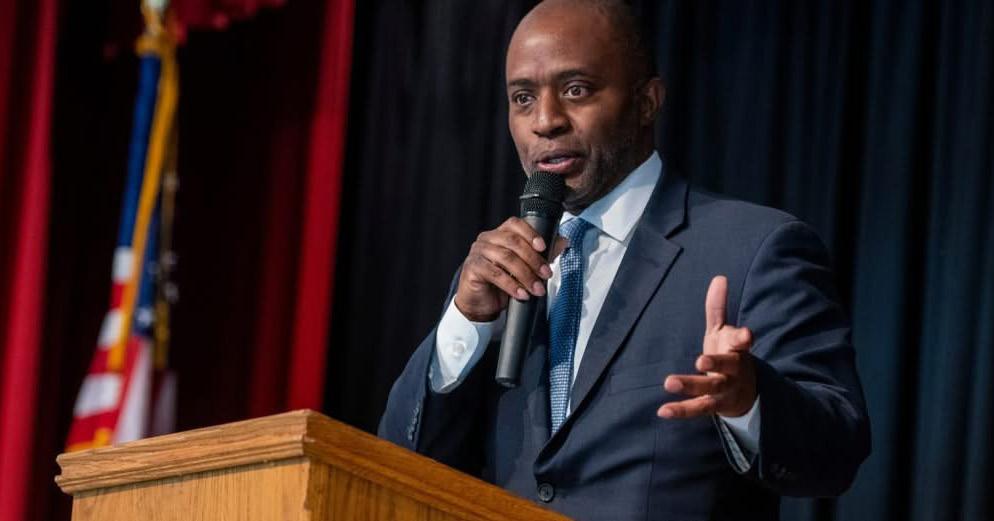
tions regularly punish the effects of poverty as neglect.
She also shows that blaming tural problems, while ignoring the historical roots of economic and social inequality, fails families and communities.
Roberts argues that the engrained oppressive features of the current system render it beyond repair. She calls for creating an entirely new approach focused on supporting families rather than punishing them.
By Bo Tefu California Black Media
CPS disproportionately investigates Black and Indigenous families, especially if they are lowincome, and children from these families are much more likely than white children to be removed from their families after CPS referral.
In “Torn Apart: How the Child Welfare System Destroys Black Families—and How Abolition Can Build a Safer World (2022),”
Roberts traces the historical, cultural, and political forces driving the racial and class imbalance in child welfare interventions.
These include stereotypes about Black parents as negligent, devaluation of Black family bonds, and stigmatization of parenting practices that fall outside a narrow set
California Superintendent of Public Instruction Tony Thurmond has urged educators to remain focused on student achievement following a court ruling that temporarily blocks the Trump administration from freezing federal funding for schools, health care, law enforcement, and disaster relief.
Her support for dismantling the current system of child welfare is unsettling to some, but her provocation inspires many to think more critically about its poor track record and harmful design.
A U.S. District Court judge in Rhode Island issued a Temporary Restraining Order (TRO) on Jan. 31, halting federal efforts to pause funding while a lawsuit led by California Attorney General Rob Bonta and 22 other state attorneys general moves forward. Thurmond, a declarant in the case, welcomed the decision and reassured educators that funding for critical school programs remains in place.
By uncovering the complex forces underlying social systems and institutions, and uplifting the experiences of people caught up in them, Roberts creates opportunities to imagine and build more equitable and responsive ways to ensure child and family safety.
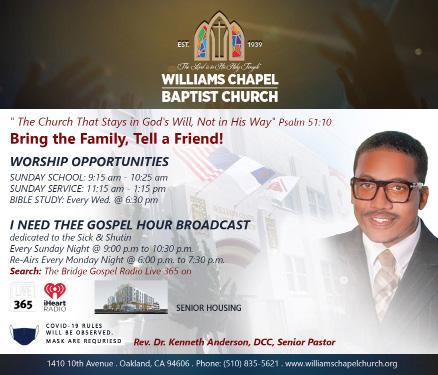
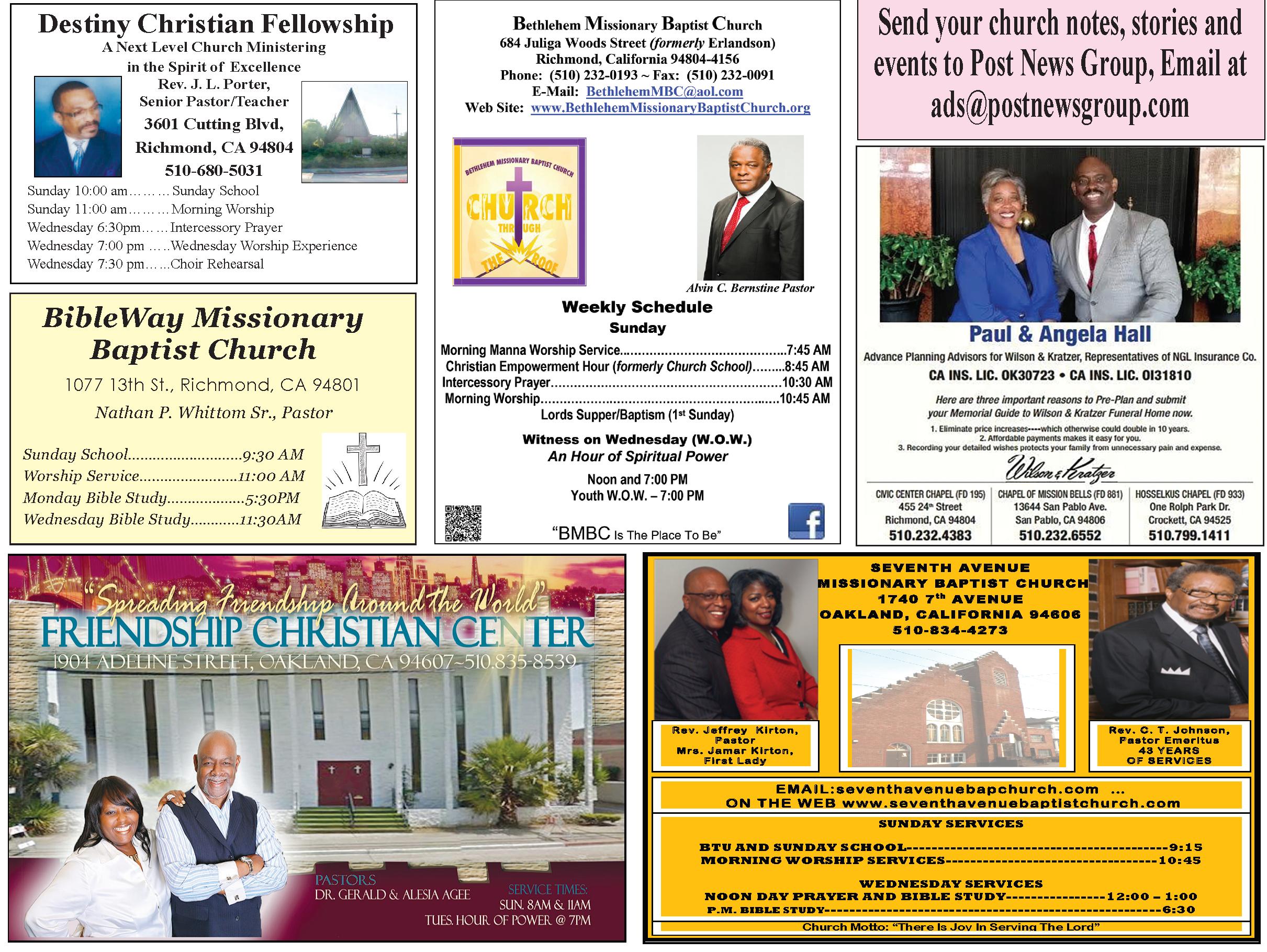


Continued from page 2
hosted by Marcus Books, a historic Black independent bookstore, and Eastwind Books, which now exists online.
In an interview with the organizers of Open E.A.R.S. for Change, they talked about the event and their future goals to encourage Asian-Black unity. Lee called the Lunar New Year x Black History Month Community Celebration “the anchor event” that brings the communities together every year. She wants to do more
such cross-cultural events, though on a smaller scale, like hosting a local author for a speaking engagement.
As younger generations tend to be more involved in activism and advocacy, OACC hopes the celebration will encourage older generations to join in as well. “Historically, this program was geared towards the Chinese community,” Lee said. That had made it easier for older generations to attend, but now “the focus has shifted… [there are] more family units and multicultural audiences.”
Although more diversity means more reach and engage-
ment from different communities in Oakland, it also means there is still much work to be done. Emily Grover, the OACC Program and Communications coordinator, emphasized that they are “trying to improve language access in other programs,” one example being more translation options similar to the ones provided by the exhibition.
OACC works closely with refugee and immigrant communities to support them and provide resources in multiple Asian languages. Despite some concerns with accessibility, they are confident more opportunities will arise
as long as they persevere and continue to spread the word. “Programs are largely free,” said Director of Programs & Exhibitions Indra Mungal. She added, “and we invite the public to check out the classes and spaces available to be rented here.”
Lee wanted to stress that regardless of language barriers, these programs are created with the intention of contributing to a more diverse society: “Even if the language changes, our work will not change.”
For more information, visit www.oacc.cc

By Terri Schlichenmeyer
Author: Josephine Baker. Translated by Anam Zafar and Sophie Lewis. Foreword by Ijeoma Oluo, c.2025, Tiny Reparations Books, $32.00. You march to the tune of your own drummer because you like the beat. It’s the same cadence you carry in your heart and soul, and it sets your pace and your path. No one else’s pulse matches yours, no one else’s rhythm will do. You march to your own drummer and as in the new memoir, “Fearless and Free” by Josephine Baker, translated from the French by Anam Zafar and Sophie Lewis, you dance to it, too.
When he first met Josephine Baker in 1926, journalist Marcel Sauvage suggested that she might want to write her memoirs, and the twenty-year-old Baker laughed at his idea. Later that year, when he sat down to hear her story, he learned that Baker was prone to laughter.
Baker was born into poverty in 1906 in St. Louis, she told Sauvage, and she began dancing to keep warm.
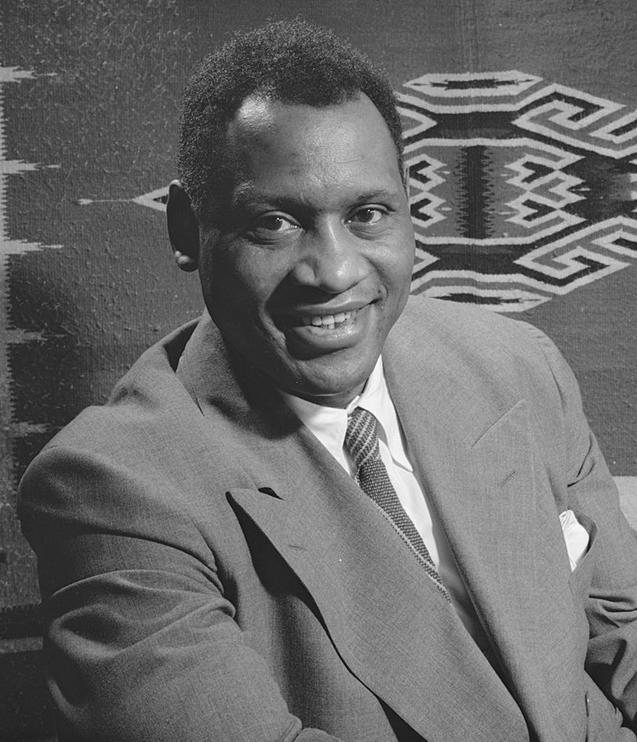
By Tamara Shiloh
Paul Robeson was born April 9, 1898, in Princeton, New Jersey. At 6’ 3”, he was a towering man of intellect, talent, and conviction. Before he became an international icon, he earned his law degree from Columbia University in 1923, supporting himself by teaching Latin and playing professional football on the weekends. But the law would not hold him for long. His voice had other plans.
Robeson first gained widespread recognition on stage and screen, delivering commanding performances that captivated audiences. Yet, it was his voice in concert halls
that sealed his legacy. His repertoire was vast, spanning spirituals, classical compositions, global folk traditions, and songs of struggle — music that carried the weight of the oppressed and the hopes of the marginalized. In 1921, he married Eslanda Goode, a fellow Columbia student and a journalist with her own remarkable intellect and ambition. Their marriage, which lasted over four decades, was a partnership in every sense. Goode became his manager, encouraging him to leave law behind and fully embrace his calling. In 1927, they welcomed their son, Paul Robeson Jr.
By the mid-1920s, Robeson was making waves in theater. He starred in All God’s Chillun Got Wings (1924) and The Emperor Jones (1925). That same year, he made his film debut in Body and Soul, directed by pioneering Black filmmaker Oscar Micheaux. In 1928, he mesmerized London audiences in Show Boat, where his rendition of Ol’ Man River transformed the song into a powerful anthem of resilience.
Robeson and his family moved to Europe in the late 1920s, and over the next decade, he built an impressive career in both film and music. He starred in Borderline (1930) and later again in the 1933 film adaptation of The Emperor Jones. Over the next few years, he appeared in six British films, including Jericho and Big Fella (both released in 1937). He also starred in the second screen adaptation of Show Boat (1936), alongside Hattie McDaniel and Irene Dunne. However, his final film, Tales of Manhattan (1942), left him deeply disillusioned. He openly criticized its degrading depiction of Black life, signaling his growing commitment to using his platform for activism.
In 1963, after years of political persecution and declining health, Robeson returned to the United States. Following Goode’s death in 1965, he lived quietly with his sister. On January 23, 1976, Robeson passed away from a stroke at the age of 77 in Philadelphia.
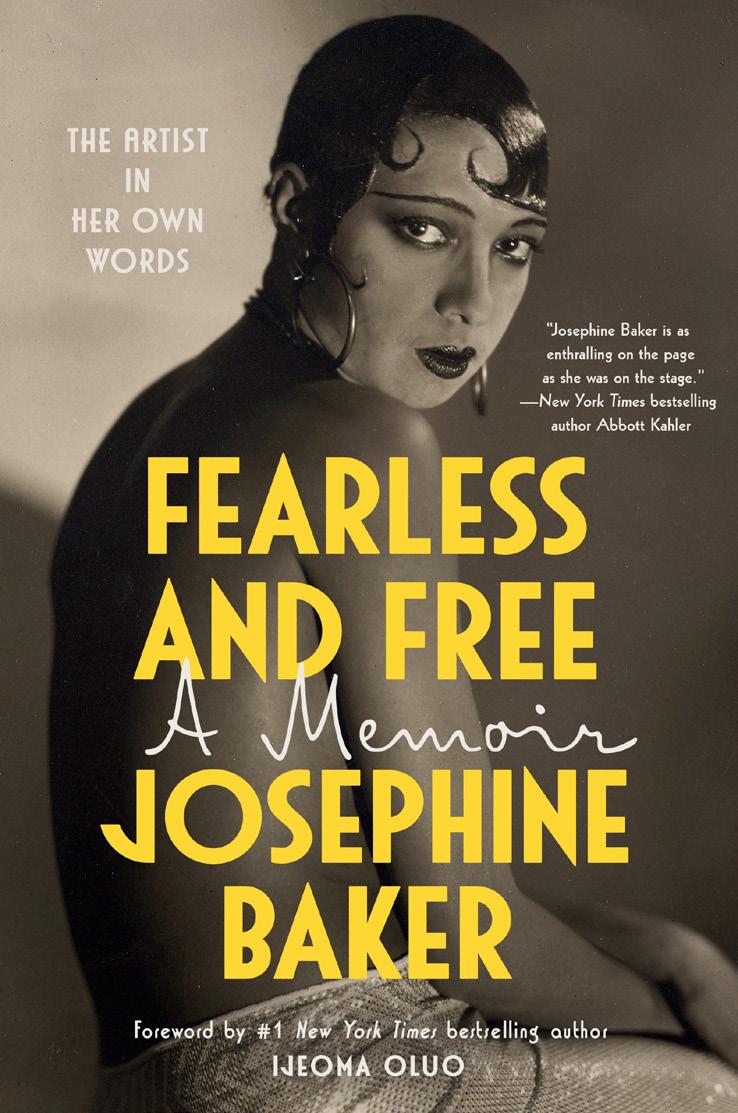
She grew to love performing, but earning money was more important so Baker left school at age eight to work. She made her official debut in Philadelphia at age 16 and worked her way to a better-paying job in New York before leaving for Paris, where she was a national sensation. Audiences couldn’t get enough of her humor or her then-scandalous “banana dance.” Oooh, la la! Baker was welcomed, not just in France but around Europe, where her performances were celebrated. She shared with Sauvage all the places she’d been, and which were her favorites. She reminded him that she’d once known poverty, which is why she tried to help poor children and widows in the cities where she performed. She told him about the people she knew and those she loved, though she promised that she wouldn’t give details.
She had little good to say about her return to America. As biographies go, “Fearless and
Comparing Histories: Continued from page 2
That panel was part of the Northern California Time of Remembrance (NCTOR) committee’s Annual Day of Remembrance program organized in partnership with the California Museum.
Tamaki, who is Japanese American and the only nonBlack member of the task force, said the Black and Japanese experiences in America have some parallels but there are significant differences as well.
“When you look at reparations, and this was the eye opener to me, it’s actually a unifying concept,” Tamaki said. “There’s no equivalence between four years in a concentration camp that our community experienced
and 400 years of oppression.”
Tamaki explained, “We do have some things in common.
Japanese know something about mass incarceration and profiling and the consequences. In that respect, there is a reason for all of us, whatever our background, to start looking at (reparations). We have to cure the body and not just put a band-aid on it.”
Grills is a clinical psychologist whose work focuses on community psychology. A Professor of Psychology at Loyola Marymount University, she us also a past president of the Association of Black Psychologists.
Tamaki is a senior counsel at Minami Tamaki LLP. He has spent decades working with AAPI legal services programs. In the 1980s, he participated in the Japanese American reparations move-
Free” is very good, but only to a point. Although journalist Marcel Sauvage briefly touches on Baker’s later life and he hints at her work during World War II, that work is not addressed, nor is Baker’s famous “Rainbow Tribe.” Missing, also, is her later life. In short, the book is too short. And yet, what’s there is stellar. Baker was funny and wise and singleminded and that all comes out in her words, as Sauvage kept them. You’ll be delighted in that, but you may be surprised at the almost-gentle way she talked about the racism she experienced on return visits to America. Readers may get the sense that Baker was absolutely the type to stand up for herself, but she also understood that stardom in the Jim Crow era demanded discretion. This is the kind of book that’ll make you search online for videos of its author onstage, and it’ll send you in search for other books about Baker. Though it doesn’t include enough years, if you love biographies, “Fearless and Free” can’t be beat.
ment and served on the pro bono legal team that reopened the landmark 1944 Supreme Court case of Fred Korematsu.
The case resulted in overturning Korematsu’s criminal conviction for violating the incarceration order that led to the imprisonment of 125,000 Japanese Americans after the attack on Pearl Harbor. Earnest Uwazie, a Sacramento State University criminal justice professor and director of the Center for African Peace and Conflict Resolution, was one of more than 100 persons who listened to the two-hour discussion.
“It’s always great to hear from the people involved in the study of reparations and it is good to get a comparative with the Japanese experience,” said Uwazie. “This was extremely informative.”
The Peralta Community College District (PCCD) is seeking proposals from qualified firms to provide Laney College Food and Supplies Services (RFP No. 24-25/11). Proposals are to be submitted electronically (via Planet Bid), until 2:00 PM on March 10, 2025.
Scope of work
PCCD is seeking a vendor who can:
• Supply both food and other supplies necessary for the operation of its Cafeteria and Bistro
• Deliver supplies within 24 hours of order
• Provide monthly reports of spending on food and supplies
A Mandatory Pre-proposal zoom meeting will be held on February 19, 2025 at 2:00 PM. via Zoom: Conference Meeting ID 812 8895 2202. Register in advance for this meeting:
https://peralta-edu.zoom.us/meeting/register/dhaOLARyRzGKxH_fRMqBSg
After registering, you will receive a confirmation email containing information about joining the meeting.
Copies of the proposal documents may be obtained by clicking on the following link: https://vendors.planetbids.com/portal/71895/bo/bo-search
Governing Codes:
GC 53068
EC 81641
Publication Dates: February 7, 2025 and February 14, 2025
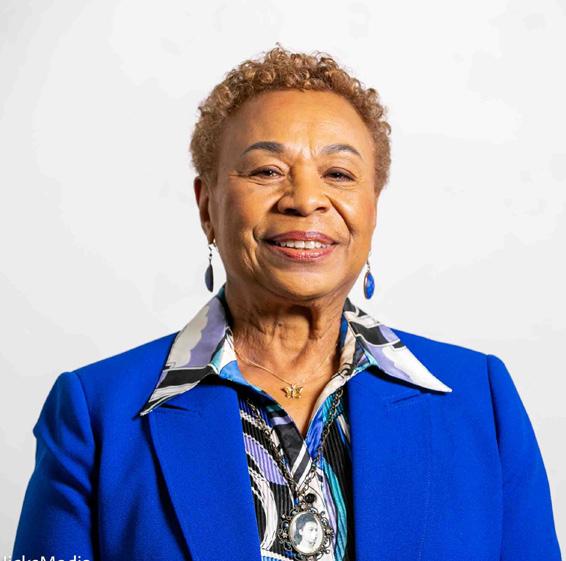
By Post Staff
The people of Oakland expect and deserve transparent, accountable government that serves the people, not special interests, according to Oakland mayoral candidate Barbara Lee, who pledges to bring the same “energy, ideas, and dedication” to ethics in City Hall that she had in Congress.
“There should be no tolerance whatsoever for secret pay-toplay schemes that erode the public trust. Oaklanders expect and deserve leaders who have only one agenda—honest, accountable leadership that serves the people of Oakland,” she said.
In a statement released recently, Lee said she fully supports current efforts by the League of Women Voters, Common Cause, ACLU and Oakland Ethics Com-
missioners to look at how to strengthen accountability and trust in government.
She said she supports a review of the city charter to clarify lines of accountability between the city administrator and elected mayor, so the City of Oakland uses every tax dollar wisely to deliver essential services in the most efficient ways.
In addition, Lee said, the current prohibition on gifts to elected officials is too loosely worded and should be strengthened to ensure no one is prone to influence. There is also no user-friendly portal where any member of the public can view contract scopes and amounts, which should be available online for public review.
She also supports the city pursuing available legal remedies to secure financial relief or judgements against persons or entities convicted of defrauding the City or using illegal means to profit on the backs of Oakland taxpayers.
Though Oakland’s governmental structure is complex, leadership is what matters, she said. The city needs reforms to ensure accountability and transparency and needs leadership.
Lee said she is proud of her strong track record on ethics and
integrity.
As a congresswoman, she was a leader in one of the most sweeping political ethics reforms, which banned gifts from lobbyists and prohibited House members from traveling on private planes, among other vital reforms. That reform law ended pay-to-play schemes that had run rampant in Washington, D.C.
Congresswoman Lee also played a key role in the comprehensive ethics reform package in 2007, which required lawmakers to disclose how much campaign cash lobbyists raise on their behalf and what earmarks they have requested.
Starting from her very first day in Congress, she supported campaign finance reform to get big money out of politics, including limiting the size of campaign donations.
She spearheaded efforts to overturn the Citizens United decision, which opened the floodgate to unlimited spending by billionaires to buy elections.
She supported public campaign financing to combat the influence of big money in politics, including with the Government By the People Act.
Barbara Lee for Oakland Mayor Opens Campaign Headquarters in the Heart of Downtown Oakland Hundreds of Volunteers Expected to Rally and Kick Off Field Campaign
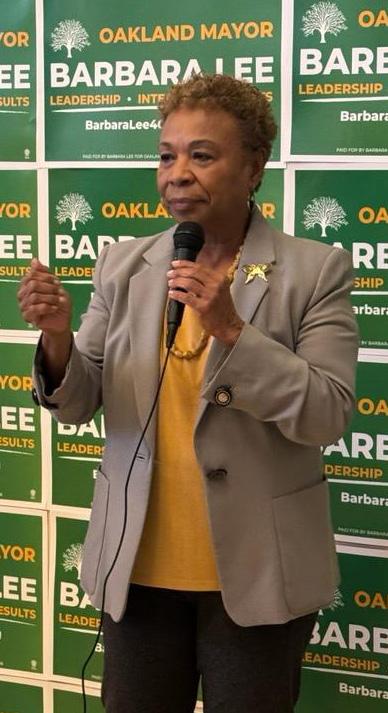
Special to the Post With Oakland’s Special Election on April 15 just a little over two months away, Barbara Lee’s campaign for Oakland Mayor continues to build momentum. Saturday, Feb. 8, at 10 a.m., the Barbara Lee for Oakland Mayor campaign opened its headquarters, launching a field campaign with hundreds of volunteers. Alameda County Supervisor Nikki Fortunato Bas, Oakland City Councilmember Janani Ramachandran were in attendance.
The headquarters will serve as the heartbeat of the Barbara Lee for Oakland Mayor campaign. The grand opening and field campaign kickoff was a festive atmosphere with hundreds of volunteers, music, campaign signs, followed by

phone banking and canvassing.
“This is more than just a campaign—it’s a community-driven effort to build an Oakland where every resident feels safe, supported, and inspired,” said Barbara Lee. “I am running for Mayor because our City’s future hangs in the balance. As a hands-on Mayor, I will be focused on improving our safety, addressing our homelessness crisis, and establishing trust, accountability and confidence in our city government. Together, we can shape Oakland into a thriving, vibrant city that works for everyone.”
For more information on the Barbara Lee for Oakland Mayor campaign, please visit: barbaralee4oakland.com
1111 Broadway, Suite 800, Oakland, CA 94607 (510) 208-7400 • www.alamedactc.org Request for Qualifications (RFQ) for Construction Manager/General Contractor (CM/GC) Services for Rail Safety Enhancement Program - Phase A (RFQ No. R25-0005)
The Alameda County Transportation Commission (Alameda CTC) is seeking statements of qualifications for a contract to commence services on August 25, 2025, or as indicated in the RFQ and/or appropriate addenda.
Key Dates:
• A mandatory pre-submittal conference will be held online: February 24, 2025, at 1:00 p.m. Pacific Time (PT)
• Proposal due date: March 18, 2025, at 3:00 p.m. PT
This contract will be funded in part by Federal Railroad Administration’s Consolidated Rail Infrastructure and Safety Improvements funding and as such, will not be subject to a Disadvantaged Business Enterprise Program or the Alameda CTC Local Business Contract Equity Program. However, Alameda CTC strongly encourages each proposer to consider the use of disadvantaged, local and/or small business enterprises in its proposal. Any contract resulting from this RFP will be awarded without discrimination based on race, color, religion, sex, sexual orientation or national origin.
All RFQ documents are available Procurement Portal at https://alamedactc. bonfirehub.com. All questions regarding this RFQ must be submitted via the Procurement Portal, no later than 3:00 p.m. PT on February 28, 2025.
Submittals must be made in accordance with the instructions in the RFQ. Any contract awarded must be in compliance with the local, state, and/or federal requirements.
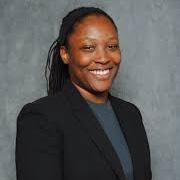
By Dr. Imani McElroy,
As I became part of the small community of Black female surgeons, who represent less than 1% of all physicians, I embraced the responsibility with an understanding that part of my career would be dedicated to being a voice for marginalized and disenfranchised people.
Growing up in the San Francisco Bay Area, I observed the vast economic divide that contributes to health care disparities. Unstable employment and housing, food deserts, underfunded schools, and escalating living expenses all play a significant role in poor health for Black patients.
They also are a direct reflection of centuries of systemic discrimination and racism that has crippled Black Americans dating back to the era of slavery.
The same issues have followed me personally. I live with asthma, which has quietly impacted my breathing since childhood. I have been fortunate to avoid long-term hospitalization, but I have had numerous visits to urgent care and emergency departments.
I discussed my symptoms with my primary care physicians over the years, but it wasn’t until my third year living in Boston that I found a physician who attended to my symptoms and made the necessary adjustments that finally controlled my asthma. My asthma had progressed steadily for 15 years and despite being in the medical field and being able to describe the decline, my symptoms were ignored.
This is a story that is too common among Black Americans. Even fame could not protect Serena Williams when she had to demand appropriate testing and treatment for blood clots in her lungs following the birth of her first child.
I understood that my role as a health care provider extended well beyond the walls of the operating room and the hospital.
The plight of Black Americans within health care and the discrimination we face is well doc-
... Continued from page 4
In a statement and a letter to California’s local educational agencies (LEAs), Thurmond praised efforts to reduce chronic absenteeism and close achieve-
ture and lay literature. Making sure that our community has updated and accessible information that can impact their understanding of their medical conditions and improve the quality of care they receive.
As a Black woman in America, I face my own challenges, including navigating the health care system, and finding providers who look like me, understand my unique needs, and are willing to engage with me despite my medical background.
umented in both medical and lay literature.
In medicine, we celebrate J. Marion Sims as the father of obstetrics, but until recently, we rarely mentioned that most of his medical breakthroughs were achieved through the suffering of Black women who were not adequately anesthetized as he experimented on some of the most delicate parts of their bodies. Books such as “Medical Apartheid” and “The Immortal Life of Henrietta Lacks” document the long history of Black bodies being used for scientific experimentation without any compensation or acknowledgement.
If we are going to have an honest discussion about the root cause of medical mistrust within the Black community, the conversation cannot simply begin and end with the United States Public Health Service (USPHS) Untreated Syphilis Study at Tuskegee.
It’s essential to recognize that the generational trauma endured by the Black community contributes significantly to its skepticism towards medical institutions.
Healthcare advocacy is multifaceted. From physician-led initiatives addressing policy and resource allocation, to research that intentionally and thoughtfully addresses disparities in access and outcomes, to development of integrated multidisciplinary treatment teams for personalized care plans, there is quite possibly no more important step than educating the lay person.
Gone are the days of blind trust in a physician simply because of their title.
Furthermore, being able to empower patients to advocate for their health care needs will also allow physicians to understand how medical conditions impact their patients’ quality of life and everyday activities. Shared decision-making rests on a patient’s ability to trust the providers caring for them. The medical community owes it to Black Americans to afford them this trust.
As an advocate, I aim to bridge the gap between medical litera-
ment gaps, particularly for socioeconomically disadvantaged students.
As my family members grow older and begin to interact more frequently with medical providers, I find myself in the frustrating position of having to help them advocate for themselves in a system that does not always listen. My white coat does not shield me from the realities of being Black in America and thus I feel it is my duty to become part of the solution in addressing disparities in healthcare.
While much of the work to fix this problem falls in the hands of physicians and providers, active participation is required from both sides.
Increased representation in clinical trials will improve our understanding of risk factors and treatment responses. Attending health fairs and community outreach events will help increase medical literacy and understanding. Being persistent and truthful about symptom progression or treatment side effects is equally as important to help inform decision making.
Most of our medical knowledge is hidden behind paywalls buried in medical jargon. My goal is to help make what is happening in the medical community more accessible to our community.
About the Author
A native of the Bay Area, Dr. Imani E. McElroy is a clinical fellow of Vascular Surgery at USC Keck School of Medicine. She completed general surgery training at the Massachusetts General Hospital in Boston, MA. She has a master of Public Health from the Harvard T.H. Chan School of Public Health and received a Doctor of Medicine from the Charles R. Drew University/UCLA David Geffen School of Medicine. She earned a bachelor’s degree in Biological Sciences from the University of California Irvine.
This article is supported by the California Black Health Journalism Project, a program created by California Black Media, that addresses the top health challenges African Americans in California face. It relies on the input of community and practitioners; an awareness of historical factors, social contexts and root causes; and a strong focus on solutions as determined by policymakers, advocates and patients.
“Now is not the time to be distracted by external efforts to demean and divide,” Thurmond wrote. “Please continue to stay the course with local programs that are producing results. Our students need consistency, support, and community more than ever.”
Thurmond emphasized that state officials will continue advocating for stable funding to ensure schools can maintain and expand programs that help students succeed.
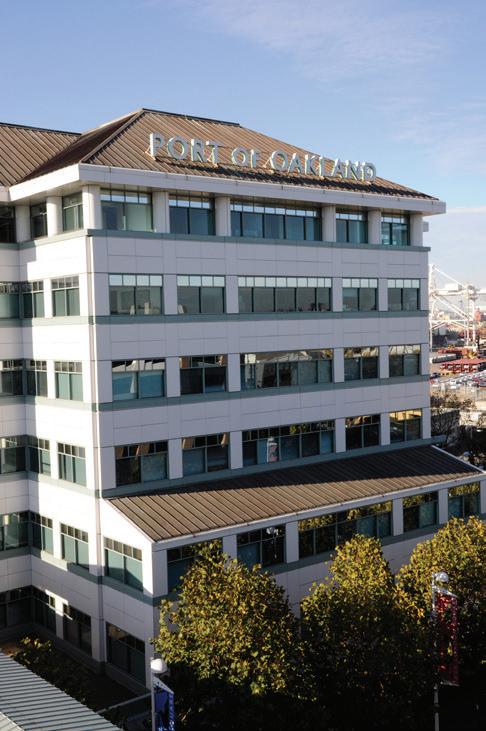

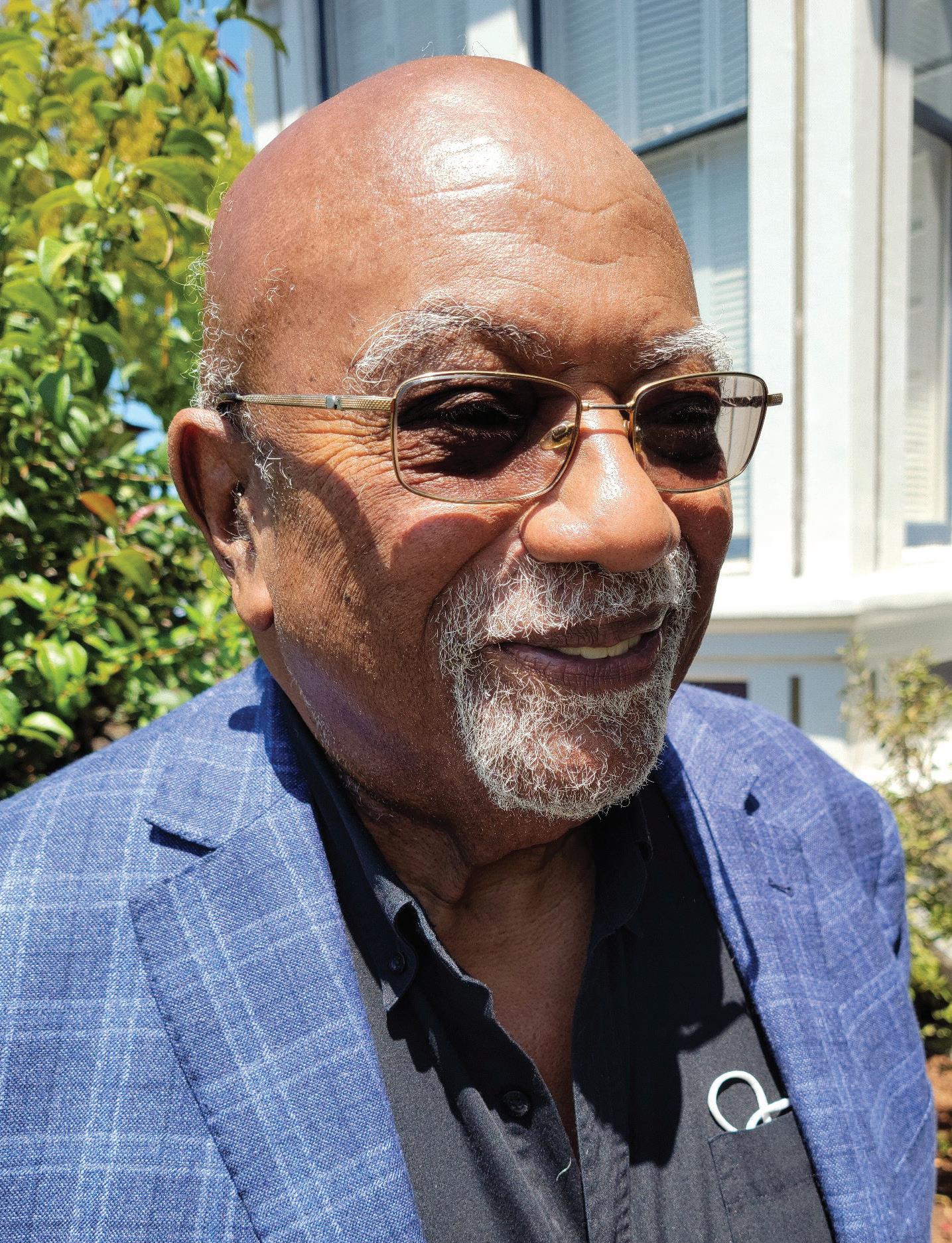
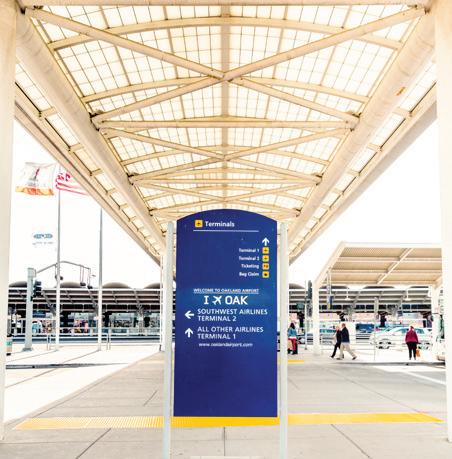
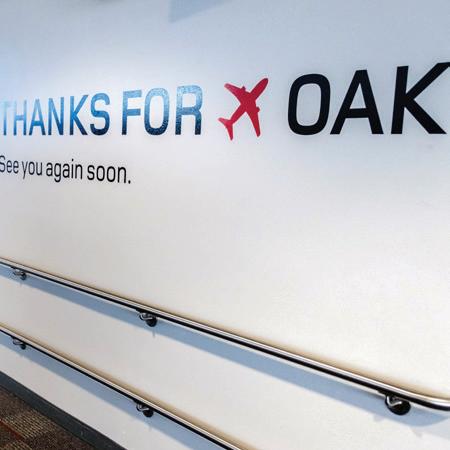

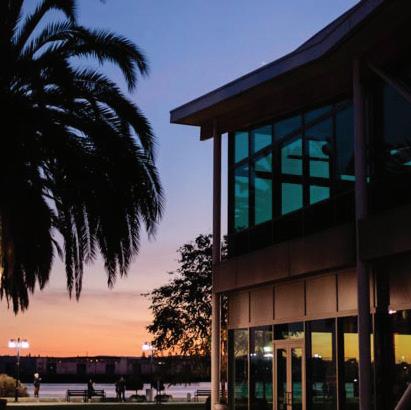
In the 1960s, Paul Cobb and his brother were among the first Black ship clerks hired at the Oakland Seaport. Cobb was later instrumental in helping the Port of Oakland move forward with its dredging initiatives.

Thank you, Paul Cobb for your lifetime of contributions to the community and your continued partnership with the Port of Oakland
Save Oakland Fire Stations ...
Continued from page 1
block due to our budget crisis, and will re-open two closed stations that have already been closed –Station 25 and 28 – in the near future. The resolution that will provide the funding to keep our stations open will go before the full City Council for a vote at our meeting on Tuesday, March 4th at 3:30 p.m. – and we invite you to join us at City Hall to share your perspective on the topic.
Our budget crisis – one of the worst in Oakland’s history – is compounded by the fact that people do not feel safe coming to Oakland due to our public safety crisis. By investing in our fundamental public safety resources today, we can send a signal to the world that Oakland is open for business. We have such a rich and vibrant culture, arts, and food scene that is worth celebratingbut we can only showcase this if we are able to keep our neighborhoods safe. Having fully functioning fire stations are absolutely essential to these efforts.
With the devastating Los Angeles fire at the top of people’s minds, terrible memories of
All City Employees
Return to Office ...
Continued from page 1
Biden had declared an end to the pandemic in September 2022, and that since then, “We have collectively moved into newer, safer health conditions.”
Johnson said “multiple departments” already have all their staff back in the office or workplace.
The City’s COVID-era policy, enacted in September 2021, was designed to reduce the spread of the debilitating and potentially fatal virus.
Many cities and companies across the country are now ending their pandemic-related remote work policies. Locally, mayoral candidate Loren Taylor in a press conference made the policy a central issue in his campaign for mayor.
City Hall reopened for in-
Oakland’s own wildfires are resurfacing from the 1991 Oakland Hills Firestorm to the Keller fire just a few months ago – and how essential fire stations are to mitigating these catastrophes. But in Oakland, our fire stations don’t just fight wildfires – they also provide emergency medical services to our most vulnerable constituents, put out structural fires and encampment fires, and much more.
We recognize that there are a number of competing interests and important initiatives fighting for sparse City resources. But from my perspective, core safety services are the most pivotal functions that a City must spend its resources on – especially given the outcry we have heard around fire stations.
The fight to save our stations is not over. The resolution we introduced is a critical first step, and there are hurdles to overcome. If you support keeping our fire stations open, we invite you to be a part of the solution by making your voice heard at the March 4th City Council meeting at 3:30 p.m.
person meetings two years ago, and the city’s decision to end remote work occurred before Taylor’s press conference.
At an endorsement meeting last Saturday of the John George Democratic Club, mayoral candidate Barbara Lee said she agreed that city workers should return to the job.
At the same time, she said, the city should allow employees time to readjust their lives, which were disrupted by the pandemic, and should recognize individual needs, taking care to maintain staff morale.
The John George club endorsed Lee for Mayor and Charlene Wang for City Council representative for District 2. The club also voted to take no position on the sales tax measure that will be on the April 15 ballot.
Mayor Jenkins Leads AllStar Community Cleanup
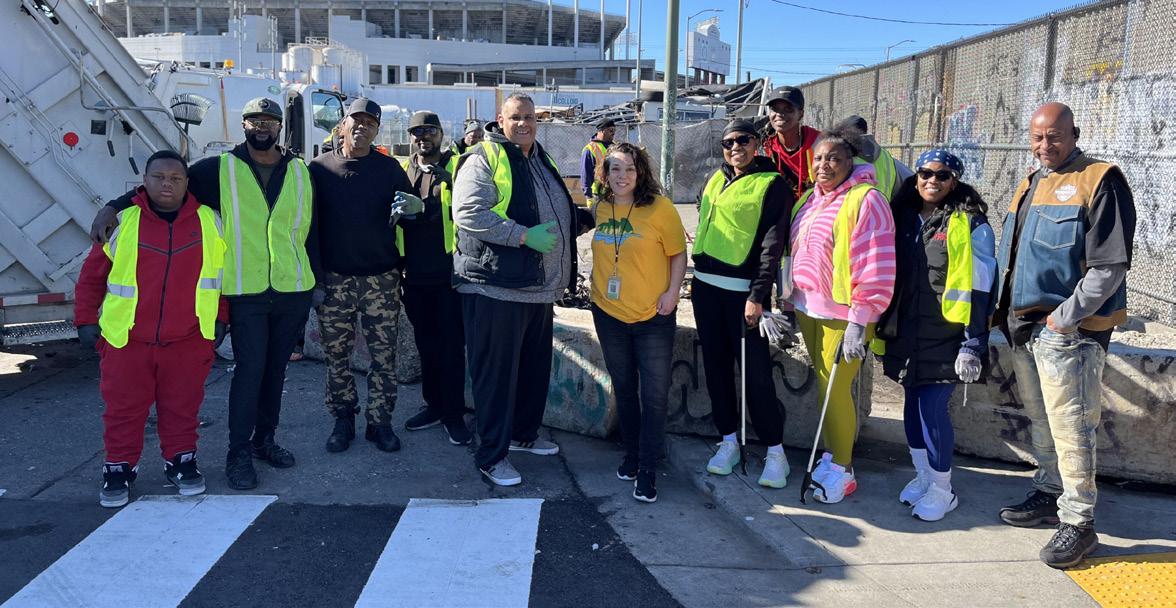
By Post Staff
Mayor Kevin Jenkins, in partnership with the City of Oakland, PG&E, Tip Top Shape, Wiseguys Motorcycle Club, The Dragons Motorcycle Club, the African American Sports and Entertainment Group (AASEG), CEO, and Prayerline Ministries, hosted two community cleanup events in preparation for the NBA All-Star festivities.
The cleanups focus on beautifying the Coliseum and Hegenberger neighborhoods.
“Oakland is putting its best foot forward in anticipation of the thousands of fans that will be celebrating the NBA All-Star Games,” said Oakland Mayor Kevin Jenkins. “As the City continues to double down on blight and beautification in East Oakland, we also know community partnerships like this are essential for the sustained health of Oakland’s communities. I am incredibly grateful for the community for reaching out to my office to help put togeth-
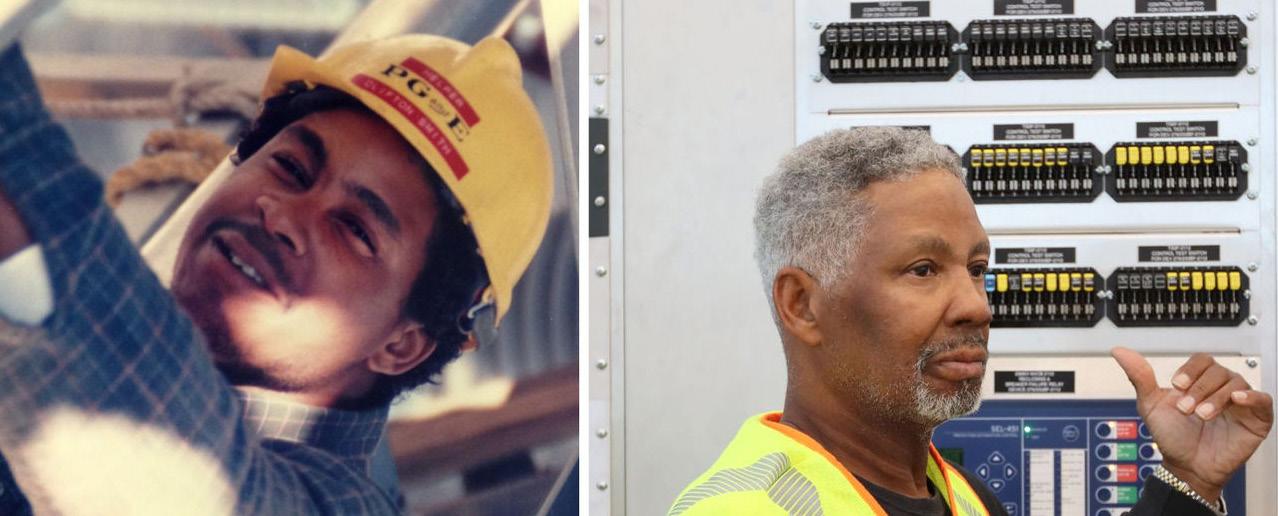
Special to the Post June 14, 2003. A day Clifton Smith Sr. will never forget.
Clifton, then an electrical technician at the Helms Pumped Storage Plant east of Fresno, was an hour into his shift. He was deep inside the underground plant to replace a failed breaker for one of the water pumps.
Clifton and his coworker, Rick Cheney, were placing a rubber blanket over another existing energized breaker. But an exposed wire, combined with other factors, triggered an electrical explosion.
The explosion blew Clifton 15 feet backwards. If he hadn’t hit a guard rail, Clifton said he “would have gone over the railing and fallen 50 feet down to the basement onto a concrete floor.”
The accident burned more than 40% of Clifton’s body. “From my belly button all the way up to the top part of my forehead,” he said. “I retain heat from the middle of my chest to my right arm all the way up to just past the elbow. I don’t sweat.”
A champion for safety
He didn’t work for more than two years. As a result of Clifton’s accident, all coworkers at Helms as well as those working on job sites and locations with gas transmission and distribution, substa-
... Continued from page 1
Russell. “I befriended him as a boy and during his years at University of San Francisco” said Patterson. “We stayed friends for the rest of his life.”
Said McClymonds Principal Darielle Davis, herself a McClymonds graduate, “We are excited to honor Bill Russell for his sports accolades and because he broke color barriers. He is part of our legacy, and legacy is really important at McClymonds.”
Brian McGhee, community schools manager at McClymonds
tions and electric transmission are now required to wear flame resistant shirts and pants.
Clifton doesn’t consider himself a pioneer when it comes raising the safety bar at PG&E. But he was certainly a champion for mandatory FR clothing on the job.
Clifton believes 90% of his injuries would’ve been prevented if he had worn FR clothing. He traveled to various PG&E locations to share his story of what happened and to convince coworkers of its importance.
“I have a bucket list of the things our department has done that was substantial in making a big difference in the things we do,” said Clifton. “The FR clothing requirement was one of them.”
Clifton appreciates PG&E’s approach to safety. “Over the last 10 years, we’ve tried to be more proactive than reactive,” he said. “Being reactive tells me you don’t really care about me. Being proactive tells me you genuinely care about my well-being.”
‘I just enjoy teaching’
Clifton, who also received the 33rd John A. Britton Gold Medal Award for rescuing a family from a burning home, started his 40th year at PG&E last October. Over his four decades, the native San Franciscan has been in Electric
and former football player at UC Berkeley, said that Russell meant a lot to him and others at the school. “He was a beacon of light and hope for West Oakland,” he said. “He did a lot for sports and for civil rights.”
Starting in 2018, Ben “Coach” Tapscott worked with Patterson and other McClymonds grads, community members, and former coaches to encourage the Oakland Board of Education to endorse the naming of the school gym, which finally happened recently.
“We worked hard to make this happen,” said Tapscott. “He’s an important part of McClymonds' history, along with a lot of other famous graduates,” he said.
Operations as an apprentice, journeyman electrician, subforeman, electrical technician, maintenance supervisor, construction supervisor, maintenance and construction engineering supervisor.
These days, he’s a senior technical instructor at the electric training facility in Livermore.
Clifton teaches the basics to apprentice and journeyman electricians as well as the Engineers in Training program. He also instructs refresher courses in substation operations.
“I’m giving my all to see to it that when they come to work,” said Clifton, “they get to go back home to their families and enjoy the benefits of a hard day’s work.”
As a former journeyman electrician, Clifton also feels an obligation to pass his knowledge forward.
“It’s a code of ethics,” he said. “A journeyman has an obligation. You must train the people below you. You must take your knowledge and pass that on to improve your classification.
“I just enjoy teaching,” added Clifton, who wanted to be a teacher or a football coach before coming to PG&E.
Football is family
Clifton, whose football career was derailed by a knee injury at Fresno State, has lived the dream through his family.
His son, Clifton Jr., was the second undrafted rookie free agent named to the Pro Bowl. During that season, he returned a kickoff 97 yards and a punt for 70 yards for touchdowns. He accomplished those feats in 2008 with the Tampa Bay Buccaneers. Clifton Jr. also played for the Miami Dolphins and Cleveland Browns.
Baseball was also an option for Clifton Jr. Baseball Hall of Fame manager Tom Lasorda tried to
From East Palo Alto to Paris ...
Continued from page 1
met Nawo Carol Crawford and Miguel Overton Guerra, who she recruited as senior scholar guides for Black Paris Tours.
recruit him for the Los Angeles Dodgers. “In my opinion, he was a better baseball player,” said Clifton Sr., “but his heart was in football.”
Clifton’s brother-in-law is Tim McDonald, a starting safety on the San Francisco 49ers’ Super Bowl XXIX team. His nephews, Tevin McDonald (formerly Oakland Raiders) and T.J. McDonald (Miami) also played in the NFL. Clifton’s cousin, Terry Robiskie, was an NFL assistant coach for nearly 40 years.
In addition, Clifton’s grandson, Brandon Smith, ran for 1,900 yards and scored 28 touchdowns in leading Fresno’s Central High School to the 2024 California Interscholastic Federation 1-A state championship game.
‘I’d rather look at the blessing side’
As for the future, Clifton wants to work for “as long as I’m healthy. I love what I do.”
What would Clifton like to be known for? “Probably for my honesty,” he said about his speak-up skills. “I’m not afraid to tell you something. It’s like, ‘If you don’t want to know, don’t ask Cliff because he’s going to tell you the truth, whether it hurts or not.’ It has carried me a long way with this company.”
No matter what happens in the future, Clifton will never forget that day more than 20 years ago.
“There was some divine intervention because I shouldn’t be here today,” he said. “I’d rather look at the blessing side of it than anything else.”
been there, going way back when. And we shouldn’t be considered or consider ourselves to be strangers in any place that we go to,” he said.
er these events and I look forward to continuing this work long after the All-Star games are done.”
“I’m excited to partner with the Office of the Mayor and incredible community and corporate partners like PG&E, Tip Top Shape, Wiseguys Motorcycle Club, The Dragons Motorcycle Club, AASEG, CEO, and Prayerline Ministries for this much-needed cleanup ahead of the NBA All-Star Games,” said Samantha Wise, founder and executive director of the Community Enrichment Organization (CEO). “As we come together to adopt and beautify the Coliseum Corridor, we’re not just preparing for an event—we’re showing pride in our community. After all, it’s important to clean your house before welcoming guests, and that’s exactly what we intend to do. If this initiative is successful, we can keep it going and expand to other areas of Oakland, making a lasting impact beyond the All-Star weekend.”
Blair Underwood Visits Bay Area ...
Continued from page 1
“New Oakland” initiative. This week he kicked off his “Guess Who’s Coming to Read” literacy program in some of Oakland's middle schools with close to 1,000 books being donated by Clifford Ray, who played the center position of the 1975 World Champion Golden State Warriors. Converse sneakers also were given away to students by Ray’s fellow teammate Charles “The Hopper” Dudley. These community activations were coordinated with the San Francisco-based non-profit program “Room to Read.” Ray said he is also donating his time to read and take pictures with students to encourage their engagement and to inspire them to read more. The inspirational book “Clifford Ray Saves the Day” highlights Clifford Ray’s true story of saving a dolphin.
Underwood also spent quality time with the Oakland Ballers
ownership group and visited the amazing Raimondi Park West Oakland community revitalization site. Underwood, who had played the role of the legendary first Black Major League Baseball player Jackie Robinson in the 1996 TV film “Soul of the Game,” commended the Ballers owners.
“This group of sports enthusiasts/ philanthropists needs to be applauded for their human capital investment and their financial capital investment,” Underwood said. “Truly putting their money and passion to work,” Underwood said.
Underwood was also inspired by mayoral candidate Barbara Lee’s open-minded invitation to bring public-private partnership opportunities to Oakland.
Underwood said he wants to “reinforce the importance of ‘collaborative activism’ among those most marginalized by nonempathic leadership. We must ‘act out’ our discomfort with passionate intentions to create healthy change.”
Guerra says he is proud of his work with Black Paris Tours in that it provides a wealth of information about the rich legacy of African and African American history and influence in Paris and Europe.
“I tend to have a feeling for history always being a means of a reference point backwards … you start to understand the history, that it isn’t just the United States, that it began with African people,” Guerra says.
He said that it’s been a pleasure to watch people learn something they didn’t know before and to take them through the city to key points in Black history, like hangout spots for writers like Baldwin and Richard Wright, restaurants in the busiest parts of Paris, the home of Josephine Baker and so much more.
Although the tours are open to all, Guerra hopes that those of African descent from all over the world can embrace that they don’t have to just stay where they are because movies and media have portrayed cities like Paris to be only white, it’s multicultural and accepting to all.
“We’ve been here, and we’ve
Stevenson notes they’ve had 150,000 people take their tour over the years, with notables like former NFL quarterback Colin Kaepernick, Smokey Robinson, Steve Harvey, Miriam Makeba, and more.
Friends and former media colleagues of Stevenson compliment the BPT crew on their knowledge of the city and their ability to always keep it interesting.
“He [Guerra] just had a deep, deep wealth of knowledge and he was constantly supplanting information with historical facts and the like. I love that it was demonstrating and showing how Black people have thrived in Paris or contributed to the culture in Paris,” Candice Francis said. She toured in the summer of 2022 and stated that in the two weeks that they visited Paris, BPT was the highlight of her trip. She shared that she was proud of Stevenson and the life she’d managed to manifest and build for herself.
“Even if you’re visiting Paris for the tenth time, if you haven’t taken the tour, then by all means, take it,” Francis emphasized.
Magaly Muñoz, Gay Plair and Paul Cobb also contributed to this story. You can book your own adventure with Black Paris Tours at www.blackparistour.com.